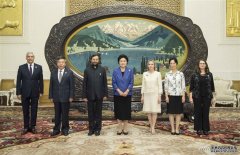Across China: More college graduates to work in grassroots
BEIJING, May 3 (Xinhua) -- Taking many hours and hiking over rugged hills to visit families living in poverty has been Liu Hai's routine since he graduated and became a junior officer in a small county in southwest China's Guangxi Zhuang Autonomous Region.
In 2014, Liu, 29, left Beijing Institute of Technology after receiving his master's degree and began working on poverty-relief work as a deputy secretary of the Youth League Committee in mountainous Nandan County.
He has now visited 151 villages in the county, including 47 in poverty.
"I had made up my mind in high school to work in China's most remote and tough places and devote myself in their development," Liu said.
Liu said that there were over 1,000 college graduates like him in Guangxi. They received their education in universities in big cities but voluntarily chose to work in under-developed areas where they were most needed.
It has not been an easy job for them to gain villagers' trust and fully understand their needs. Liu even needed a translator at the beginning.
"The solution was clear. Experience the difficulties in real life and offer true help," Liu said. "Many of them did a better job than me. I would follow their examples."
The young officer admits that what he does is not much related to his university major.
"What we learned in school was mainly scientific thought and thinking patterns. We graduates need to be practical and understand where we can give full play to our ability," Liu said. "What we are doing here is maybe just small things, but it matters to the locals. By gaining experience in handling small things, we can accomplish something big in the future."
He never regrets turning down other appealing offers at his graduation, including from international companies and state-owned enterprises.
"I told my parents there was no coming back, and they could not understand my decision at that time," he said. "Since I told my family about my life and work here, they have become quite supportive."
Like Liu, Abulimit, 28, did not choose to work in Beijing after graduation in 2016, but returned to his hometown Urumqi, capital of China's Xinjiang Uygur Autonomous Region, where he felt needed and fulfilled.
Abulimit believes what he learned at university was gratitude, as he was exempted from tuition for his bachelor's and master's degree study. Now he is returning the favor.
He has worked as a Uygur translator in local government for over half a year. In February, he was dispatched to do a translation job in a village in Kashi city, where he also taught local farmers Chinese.
Being a son of an electric welder in Urumqi, Abulimit enjoyed talking to villagers and making friends by offering help.
"I like working in remote areas and doing what I can do for villagers. I feel happy for them when seeing their life improving," Abulimit said.
Liu and Abulimit are among the thousands of university graduates in China choosing to work in remote poverty-hit regions.
In 2017, the Chinese central government issued a guideline to encourage more college graduates to work at the community level.
College graduates were encouraged to find employment in rural areas, tourism, rural e-commerce and rural cooperatives.
The guideline encouraged college graduates to work in central and western parts of the country, northeast China and other less-developed and remote areas.
The government estimates that about 7.95 million college students will graduate this year, accounting for over half of the newly-added urban labor force.















